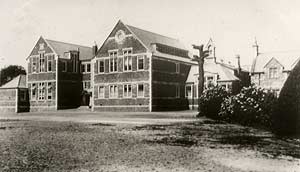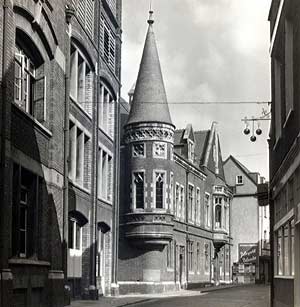
Exeter Stories
Exeter folk and friends in their own words - │ << Previous story │ Next story >> │
Peter Phillips - going to Heles School in the 1940s and a first job.
My first school was Barton Road Primary School off Cowick Street. I remember very little about it except that on Friday afternoons one could take one's favourite toy to school. From there I went to John Stocker School at the end of Buddle Lane. This was the school that all the boys in our street attended. I walked there and back each day, about ½ mile. On one occasion an American jeep went by and, like everyone, I yelled "Got any gum, chum?" A packet flew from the jeep and when I recovered it from someone's front garden I found it was five cigars. I thought dad would be very pleased with me but instead I received a clout from him with instructions never to call after the Americans again.
Hele's Grammar School
Mother and father wanted me to "get on" so I sat a test and passed for Hele's Grammar School. I started there when I was 11 years old and promptly lost my mates as I was thought to be snobby, being the only one in our group to go to grammar school.
I didn't like grammar school. I hated sports and was thus a great disappointment to my father who was a keen sportsman. The sports field was a bus ride away from school and not far from one of my aunts. (Where the new school, St.Peter’s now is). If there was a cross-country race I used to call in on Aunty Kath and have a drink before arriving back at the sports field in the last half dozen. I was never picked to play cricket or rugby, so I spent a miserable time on the touch line. Because we had Wednesday afternoons off we had to go to school on Saturday mornings, whilst the rest of the boys in the street were at the pictures or playing.
Apart from not liking sports I didn't like the school. I was quite bright academically but used to mess about in class. It was always me that was caught – talking in class, throwing the blackboard duster – I was just unlucky! I knew the inside of the headmaster's office quite well from the number of visits I made for a caning. Arthur Eastwood Nicholls, J.P. was a strong disciplinarian. He kept a cello case in his study filled with an assortment of canes and he would select one and give it a few swishes before giving the order to bend over. Every morning we had Assembly when the whole school sat in the hall for prayers, a hymn and notices. When Mr Nicholls swept, in with his gown on, you could hear a pin drop!
The school was run on Public School lines and was divided into Houses: Pendennis, Powderham, Rougemont and one other, Tintagel, with a House Captain and Prefects, the sixth formers. I was in Pendennis House. It also had a system of credits and debits with reports each month: for good work you received a credit, allotted in ¼ hours. Bad work, or misbehaviour resulted in a debit. If the total debits amounted to over two hours per month a Pink Report was issued, which had to be taken home, signed by parents and returned. Any debits at all during the month and a White Report was issued. No debits at all and a Blue Report was issued. In my time at Hele's School I think I had two Blue reports - I could paper the bedroom with Pink reports! I hated upsetting my parents and used to swear every day that I had not got any debits, but the end of the month came and the report had to be signed so it always ended in rows, tears and more promises to do better. It became so bad at one time that I stole the Form Book, in which all the entries were made, tore it up and threw it into the river.
One end of term report comment from the Headmaster read "does he want to remain in this school, or not?" However, the next term I was top of the form and he wrote "this work is excellent".
It's strange that I can close my eyes and see every corridor and classroom of that school. I remember ‘Toby’ Downing, the English master, a short, grey haired person but very pleasant. ‘Ticker’ Bailey, the French master, used to walk behind the desks and screw up boys' ears if they weren't concentrating. ‘Apples’ Haywood, Maths, was a bald headed man with hooked nose who gained his nickname from his habit of sucking his teeth at the start of every sentence. George Rickard, Chemistry and Music, was one-eyed and wore a patch. He was the organist at The Mint Methodist Church and played the organ for our wedding. 'Eggy' Eggleton taught Biology - he had a club foot and a northern accent.
Mr Cox used to teach Geography. He was also the Scout Master. We were the 11th (Exeter), Hele's School Scout Troop. Although I was a scout I didn't achieve any rank. The highlight of my scouting life was when our troop went to the Isles of Scilly for a camp (1947 or ’48). I was at some disadvantage as my left leg was in plaster from foot to thigh. This was as a result of damaging my knee after falling off my bicycle. However, we set off from St. David's station for Penzance and then by steamer, The "Scillonian". It was the roughest crossing they had had for years and the screws came out of the water at the stern as we plunged up and down. After emptying my stomach I tried to sleep for the remainder of the trip. Whilst the troop went on various expeditions I was left much to my own devices and had made friends with a local lad. His father had a greenhouse and it was full of bunches of grapes growing on a large vine. Never having seen grapes before I made a pig of myself and might, or might not, have been sick, I cannot remember!
Peter Phillips is a retired prison officer, who now lives in Yorkshire.
 Hele's
Grammar School.
Hele's
Grammar School.
The world of work
I left school in 1952. My father was by now the Superintendent Clerk for the Devon TA in Longbrook Street and earning the vast sum of £15 per week. The houses in Barley Mount were offered for sale by the owners, Exeter Workmen’s Dwellings, at £450 for a mid terrace or £500 for an end house. Dad didn’t buy.
After looking at various jobs like Customs & Excise or the Civil Service, I applied and was accepted for the job of Police Cadet in the Exeter City Police. I think the pay was about £3per week.
Police Headquarters was in Waterbeer Street and was a very old building. It is now buried under the shopping centre and Waterbeer Street is very different. Mr Rowsell was the Chief Constable. The idea of Police Cadets was somewhat new at that time and they didn’t know quite what to do with us. There were four of us and our duties consisted mainly of carrying memos and documents from one department to another, using a duplicator (no photocopiers then) and assisting with clerical duties in various departments.
There was no training programme to follow. We used to go to the swimming baths at the deaf school and were taught life saving, for which I had a bronze medal. We were also sent to day school to learn shorthand typing, the only lads in a class of girls. We didn’t do very well – there were too many distractions. We did have a uniform, and had inspections and drill, but we couldn’t become policemen until 20 years of age and National Service was compulsory at 18 years old. That’s another story.
 The
distinctive police station in Waterbeer Street.
The
distinctive police station in Waterbeer Street.
│ Top of Page │